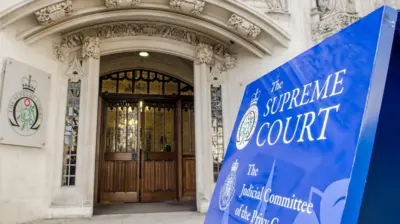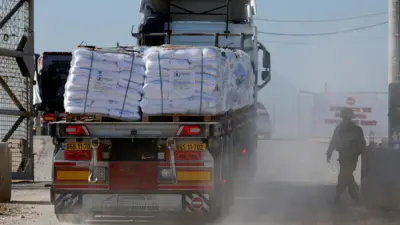We've updated our Privacy and Cookies Policy
We've made some important changes to our Privacy and Cookies Policy and we want you to know what this means for you and your data.
Wrexham sepsis death: Hospital was 'under siege'
Image source, Family photo
A woman died from sepsis after waiting almost three hours in an ambulance outside a hospital that was "under siege", an inquest has heard.
Samantha Brousas, 49, from Gresford, died on 23 February 2018, two days after being admitted to Wrexham Maelor Hospital.
But an expert told the Ruthin hearing Ms Brousas was so ill when she arrived, she was "destined to die".
Prof Solomon Almond said she was already "desperately sick".
Earlier, a health board senior manager told the inquest that when Ms Brousas arrived at the hospital its A&E unit was already full.
Dr Glyn Roberts, of Betsi Cadwaladr University Health Board, said overcrowded department was "unsafe".
He said 46 additional beds had been opened throughout the hospital, while the trust's other two major hospitals with A&E departments were also under extreme pressure.
"There was no ability to move work out of Wrexham to one of the other hospitals in north Wales," he told the court.
Paramedics who brought Ms Brousas to hospital with suspected sepsis had told the inquest they were "shocked" that she was not admitted sooner.
Sepsis, also called septicaemia or blood poisoning, should be treated with antibiotics within an hour.
Image source, Google
The inquest heard the hospital's "risk score" suggested emergency staff would be unable to perform even routine observations reliably.
Dr Roberts added: "It's a department under siege. It's difficult to think what else people working there could have done on that particular day."
Coroner Joanne Lees said an internal investigation by the health board described a "system in crisis".
Prof Almond, who was asked to give an independent opinion on Ms Brousas's death, said she would "probably have survived" if she had been taken to hospital on the morning of 21 February.
However, she was not taken to the unit until midday.
Prof Almond said by then "very sadly" she would not have survived "whatever the intervention".
The hearing continues.
Top Stories
More to explore
Most read
Content is not available








